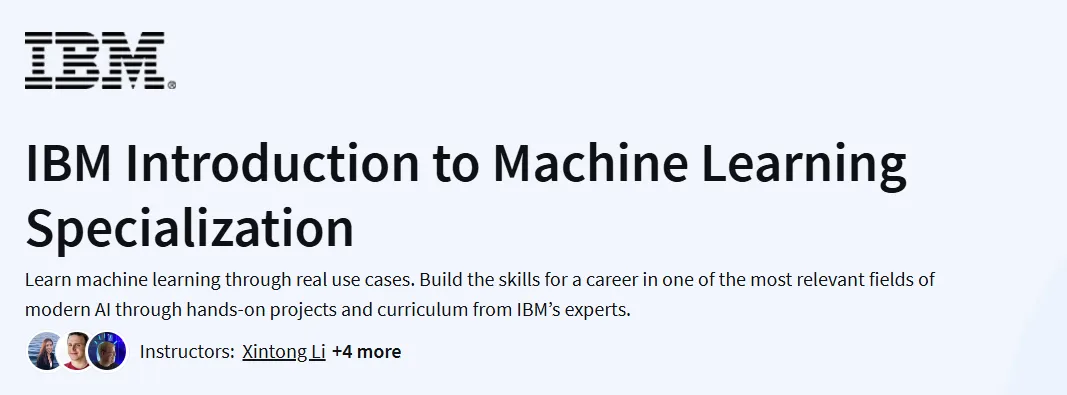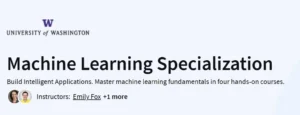What will you learn in this IBM Introduction to Machine Learning Specialization Course
Understand the fundamentals of machine learning and its applications in various industries.
Perform exploratory data analysis, including data retrieval, cleaning, and feature engineering.
Implement supervised learning techniques such as regression and classification.
Apply unsupervised learning methods, including clustering and dimensionality reduction.
Develop practical skills through hands-on projects using real-world datasets.
Program Overview
1. Exploratory Data Analysis for Machine Learning
⏳ 14 hours
Learn to retrieve data from various sources, clean and preprocess it, and perform feature engineering to prepare for machine learning models.
2. Supervised Learning: Regression
⏳ 14 hours
Delve into regression techniques, including linear regression, ridge regression, and LASSO, to predict continuous outcomes.
3. Supervised Learning: Classification
⏳ 14 hours
Explore classification algorithms such as logistic regression, decision trees, and support vector machines to categorize data.
4. Unsupervised Learning
⏳ 14 hours
Understand clustering methods like K-means and hierarchical clustering, as well as dimensionality reduction techniques like PCA
Get certificate
Job Outlook
Equips learners for roles such as Machine Learning Engineer, Data Scientist, and AI Analyst.
Applicable in industries like technology, healthcare, finance, and e-commerce.
Enhances employability by providing practical skills in machine learning and data analysis.
Supports career advancement in fields requiring expertise in predictive modeling and data-driven decision-making.
Specification: IBM Introduction to Machine Learning Specialization
|
FAQs
- Basic Python knowledge is recommended but not mandatory.
- Prior data science or machine learning experience is helpful but not required.
- The course introduces core machine learning concepts from scratch.
- Suitable for beginners, students, and professionals entering AI/ML.
- Focuses on practical applications using real-world datasets.
- Supervised learning: regression, classification, and decision trees.
- Unsupervised learning: clustering and dimensionality reduction.
- Introduction to model evaluation, metrics, and validation.
- Basics of feature engineering and preprocessing.
- Hands-on implementation using Python and IBM Watson tools.
- Coding exercises with real datasets using Python and IBM tools.
- Projects include building predictive models and evaluating performance.
- Step-by-step guidance for applying machine learning algorithms.
- Encourages experimentation with model parameters and data features.
- Builds portfolio-ready projects for career development in AI/ML.
- Useful for roles like machine learning engineer, data scientist, and AI analyst.
- Supports predictive modeling, business intelligence, and analytics projects.
- Applicable in industries such as finance, healthcare, and tech.
- Enhances practical coding, modeling, and evaluation skills.
- Provides foundational knowledge for advanced machine learning and AI courses.
- Basics of machine learning can be learned in 3–4 weeks.
- Hands-on coding and model building may take 1–2 months.
- Continuous experimentation and project work accelerate learning.
- Reviewing model evaluation and tuning improves proficiency.
- Completion provides a strong foundation for professional AI/ML roles and advanced study.





